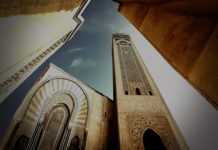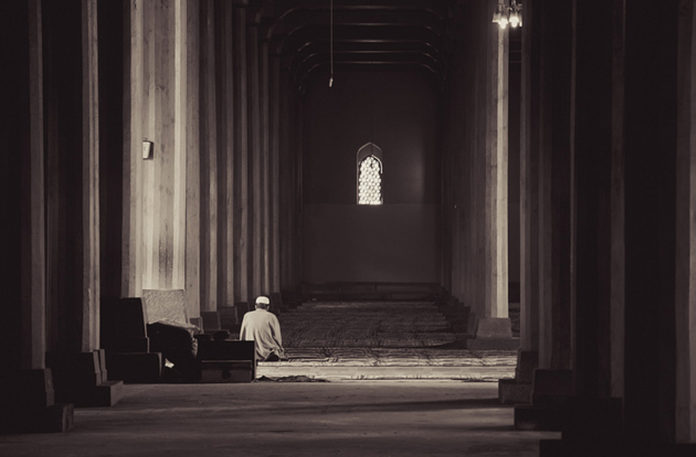Amongst those contemporary, and recent writers who accused Shaykh al-Islaam of this are: al-Habbashee al-Huraree, as-Saqqaaf and his mentor Zaahid al-Kawtharee. In fact all the attacks that are about to be raised will find their origins with one, or all of the three personalities mentioned above, from the writers of recent and contemporary times.
As-Saqqaaf says, after previously quoting an-Nawawees ruling of unbelief on the one who ascribes to Allah a jism (body):
“Entering into this category is al-Harraanee (i.e. ibn Taymiyyah) who has affirmed tajseem (Allah having a body) in many of his books. So from this is his saying in at-Ta`sees (1/101): and there is not in the Book of Allah, nor in the Sunnah of His Messenger ﷺ, nor a statement from any of the Salaf of this ummah and its Imaams that He is not a jism, and that His Attributes are not bodily, consisting of organs I say: By Allah who originated the heavens and the Earth – your saying is ignorance and misguidance. Is not Allah – the Most Highs – saying, “there is nothing like Him” sufficient in negating tajseem and its reality, O al-Harraanee?!! And what about the Imaams of the Ummah and the Salaf – O al-Harraanee – and their censure of tashbeeh .” [Daf Shubah at-Tashbeeh (pp 245-246) with its footnotes by Saqqaaf. ]
Shaykh Mashur Salmaan said in reply to this,
| “these words are from one who does not know what fairness is, who acts haphazardly in his rulings, and who falsely accuses the scholars of wickedness. This becomes apparent in a number of ways:
From them: that the previously stated words are not from the writings of ibn Taymiyyah in which he is clarifying his own views, or even stating them. Rather he is quoting the saying of the People of Kalaam (innovated speech and rhetorics). However as-Saqqaaf has conveniently omitted the beginning of the quotation from Shaykh al-Islaam ibn Taymiyyah, where he clearly stated: Qaaloo (they said)!! From them: that Saqqaaf overlooks the words of Shaykh al-Islaam ibn Taymiyyah – may Allah have mercy upon him – concerning the overall usage of this term in reference to Allah – the Mighty and Majestic – and he halted where he halted upon with knowledge. However justice is very rare – and there is no movement and power except with Allah. Shaykh al-Islaam said, in the course of this topic, indeed the term al-Jism (body), al-Arad (organs), al-Mutahayyiz (extent) are newly invented terminoligies. We have mentioned many a time before that the Salaf and the Imaams have not spoken about such things – neither by way of negation, nor by way of affirmation. Rather they declared those who spoke about such matter to be innovators, and went to great lengths to censure them. This is what has repeatedly been affirmed by Shaykh al-Islaam – may Allah have mercy on him – in many of his books, such as: Sharh Hadeeth an-Nuzool (pp. 69-76), Majmoo al-Fataawaa (3/306-310, 13/304-305), Minhaaj as-Sunnah an-Nabawiyyah (2/134-135, 192, 198-200, 527). Indeed in Sharh Hadeeth an-Nuzool Shaykh al-Islaam has labelled ascribing Allah with the term jism, by saying, an innovation in the Sharee`ah, a corruption of the language, and a contradiction to the [sound] intellect. Rather it is repudiated by the Sharee`ah, the language and the [sound] intellect. And from them: Shaykh al-Islaam mentions the intended meaning of ascribing Allah with the term jism, by saying: whosoever alleges that the Lord is a jism – with the meaning that he accepts division, separation and partition (for Allah) – then he is the most disbelieving of people and the most ignorant. Indeed, his statement is more evil than the one who says that Allah has a son – with them meaning that a part of Him split and thus became His son.” |
[al-Asaalah magazine (no.4 pp.54-55), see also his Rudood wat Taqubaat (pp 21-23)]
And at this point we quote from a writer of the own ranks of the accusers: Dr. Sa`eed Ramadaan al-Bootee who says, “and we are amazed when we see the extremists declaring ibn Taymiyyah, may Allah have mercy upon him, of being an unbeliever. And also at them saying that he was one who held Allah to be a body (mujassid), and I have studied long and hard as to where I could find a statement or a word from ibn Taymiyyah that he wrote or said which would indicate his holding Allah to be a body as was quoted from him by as-Subki and others [This is a clear indication from al-Bootee of the injustice done against ibn Taymiyyah by the likes of as-Subki and others], and I have not found anything from him like this. All I found was him saying in his legal rulings, Indeed Allah has a Hand as He said, and has risen over the Throne as He said, and He has an Eye as He said”
And he adds to this, ” I referred to the last work written by Abu al-Hasan al-Ash`aree, al-Ibaanah, and I found him saying exactly what ibn Taymiyyah said [on the issue of the Names and Attributes of Allah] ” [Nadwa Ittjaahaat al-Fiqr al-Islaamee (pp 264-265) of al-Bootee.]
The Claims of ibn Batuta
Amongst the contemporaries of ibn Taymiyyah who accused him of tajseem was the travelling historian, ibn Batuta who said, “I was present in Damascus on Friday where he (ibn Taymiyyah) was admonishing and reminding the people from the minbar (pulpit) of the congregational mosque. During his speech he said: Indeed Allah descends to the lowest heaven of the world just as I am descending now. He then descended one step of the minbar ” [al-Rihlah (1/110) of ibn Batuta.]
The falsehood of this can be seen from many angles:
This contradicts the madhab of ibn Taymiyyah concerning the Attributes of Allah – the Most High – which was the same as the madhab of the Salaf, being built upon the saying of Allah, there is nothing like Him, He is the Hearing and the Seeing.
Ibn Taymiyyah says in at-Tadmuriyyah (pg. 20), “It is a must to affirm that which Allah affirms for himself, whilst negating any likeness to Him with His creation Whosoever says: His Knowledge is like my knowledge, His Power is like my power, or Love like my love, or Pleasure like my pleasure, or Hand like my hand, or Ascending like my ascending, or His Nuzool (descent) is like my descent – then he has resembled and likened Allah to the creation. Rather it is a must to affirm (Allahs Attributes) without resemblance, and to negate (what Allah negates for Himself), without ta`teel (divesting Allah of His Attributes).”
Likewise he said in Majmoo` al-Fataawaa (5/262), “whosoever considers the Attributes to be like the attributes of the creation – such that Istawaa of Allah is like the ascending of the creation, or His Nuzool is like the descending of the creation, or other than that – then he is a deviated innovator.” And he repeats this principle over and over again in his works.
It is not possible that ibn Batuta witnessed ibn Taymiyyah deliver this speech, since ibn Batuta clearly states in his Rihla (1/102) that he entered Damascus on the 9th of Ramadhaan in the year 728H. However Shaykh al-Islaam was – before, during and after that time – in prison. Ibn Katheer states in al-Bidaayah wan Nihaayah (14/135) that ibn Taymiyyah was imprisoned on the 6th of Shabaan in the year 728H and remained there until his death on the 20th of Dhul Qadah 728H [These dates are endorsed in al-A`laam al-Uliyyah (pg.84) of al-Bazzaar, and Sahdharaat adh-Dhahab (6/80) of ibn al-Amaad.]
Ibn Batuta, may Allah have mercy upon him, did not write the book Rihla with his own hand, rather it was collected by Muhammad bin Jazee al-Kalbee who writes in the introduction to Rihla, “and I have quoted the meaning of the words of Shaykh Abu Abdullaah (ibn Batuta) with words that give the meaning that he intended .”
Ibn Batuta started his journey on the 2nd of Rajab 725H and completed it on the 3rd of Dhul Hijjah 756H and he did not write anything down, rather after this journey he dictated to al-Kalbee the events of his journey from memory. Hence the door is open for mistakes, and it is highly likely that ibn Batuta did not witness what he claimed to have witnessed, but merely conveyed the accusations that were in vogue at that time against Shaykh al-Islaam from his enemies.
Ibn Batuta himself was opposed to ibn Taymiyyah, for he states in Rihla (1/309), and from the great Hanbalee Legal Jurists of Damascus was ibn Taymiyyah, except that he was lacking in his intellect. Hence it would have been easy for him to take on board the accusations without verifying them.
Ibn Taymiyyah has a separate book concerning Allahs Descending called, Sharh Hadeeth an-Nuzool. In it is no trace whatsoever of the anthropomorphic beliefs that he has been falsely accused of.
Ibn Taymiyyah was not the khateeb of the aforementioned masjid, rather it was Qaadee al-Qazwaynee. Ibn Batuta himself says in his Rihla (1/107), “and at the time of my entering it (Damascus) their Imaam was Qaadee Jalaal ad-Deen Muhammad bin Abd ar-Rahmaan al-Qazwaynee from the great legal jurists, and he was the khateeb of the masjid .”
Ibn Taymiyyah did not used to give admonitions and reminders to the people from the minbar, rather he used to sit upon a chair. Al-Haafidh adh-Dhahabee said, “and he became very famous and well-known, and he started giving tafseer of the Might Book from his memory, on the days of Jumu`ah, sitting upon a chair.” And ibn Batuta states in his Rihla (1/108), “it was the habit of the scholars of hadeeth to read books of hadeeth on a raised chair.” And a raised chair in the Arabic language is called, minbar. [Lisaan al-Arab (5/189)]
This is why ibn Hajr mentioned in his Durar al-Kaaminah, “and he used to speak on the minbar in the way of the explainers of fiqh and hadeeth, and he used to mention in an hour, what another was unable to mention in many sittings, as if the sciences were displayed in front of his eyes” Meaning by this that he sat on a chair as done by the scholars of hadeeth.
[The above discussion is taken from Min Mashaaheer al-Mujaddidayn (pp 27-29) of Shaykh Saalih al-Fowzaan, and ibn Taymiyyah al-Muftaraa alayhi (pp 50-60) of Shaykh Saleem al-Hilaalee.
Ibn Hajr al-Asqalaanee also mentioned in Durar al-Kaaminah (pg. 154) quoting from at-Tufee that, “and they mentioned that he mentioned the hadeeth of Descent and he descended two steps of the minbar and he said, Like this descending of mine so he was imputed with tajseem (fa nusiba ilaa at-tajseem)”
This statement is by no means an evidence against ibn Taymiyyah as it only states they mentioned mentioning no eye witnesses, And in fact it only confirms, along with all that has preceded, that these were lies being spread against ibn Taymiyyah. This is the reason that at-Tufee only said, he was imputed with tajseem using uncertain phraseology.]
So with the above it is clear that the account of ibn Batuta cannot be depended upon due to his obvious confusion and the lack of coherency of his account, and due to its clear contradiction to the written words of ibn Taymiyyah.
And with this the gross exaggeration of Taaj ad-Deen Subki can also be discerned, where he said, “none of them (scholars) denied that he had said, Allah had directions and is a composition of particles coming together” [ See Albani Unveiled (pg.116)]
(NOTE: If you want to build a strong and powerful relationship with Allah, check out Islamia TV, where you can watch Islamic speakers from across the globe deliver inspiring and motivational courses. Learn more at www.islamia.tv.)







































![[Video] Fathers: 3 Tips to Build a Strong Bond with Your Kids](https://islaam.net/wp-content/uploads/2016/12/15320029_1208001002581026_5522108257843281920_n-2-218x150.jpg)









